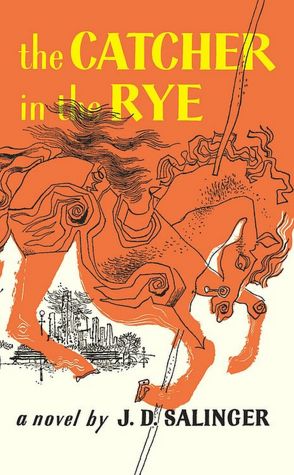Salinger, J.D. Catcher in the Rye. Boston: Little, Brown and Company, 1951.
Audience: High School students and adults: 15+
Genre: Slice of Life, Mock-Autobiography/Journal, Coming of Age
Topics of Focus: Teenage angst, belonging, family
Red Flags: Drug use/smoking, alcohol use, sexuality, strong profanity throughout, derogatory terms/actions, major depression
For at least a year, many of my friends have been telling me to read this book, using phrases such as, “It’s a classic!”, “It’s very well written!” and “I’ll disown you if you don’t read this book.” With absolutely no idea what a ride this book would give me, I opened it up and started reading. My, what a book this was.
Everyone goes through a depressive period in their teen years, and Holden Caulfield is no exception. In Catcher in the Rye, Holden is kicked out of Pencey Prep, a school that he thinks is full of phonies and mean people, and goes out to wander the streets of New York City instead of going home. There, he talks to prostitutes and drinks with old “friends,” and commentates on the human condition.
Holden is a depressed, angry, opinionated teenager. He doesn’t like people very much, and most of his social interactions are ruined by his opinions on people. Holden also hates a lot of things, from movies to phony people to being alone. Phony people are one of his least favorite things in the world; they lie, act like they’re better than others, and make you feel small, all things that make him mad. Movies bore him, and being alone makes him feel “depressed and all.” He does love his family a lot, though, especially his kid sister Phoebe. She “kills him,” or makes him laugh. He has an older brother who writes for the movies, which he thinks is stupid. Finally, he has a deceased brother who he misses dearly. “God, he was a nice kid, though. He used to laugh so hard at something he thought of at the dinner table that he just about fell off his chair. I was only thirteen, and they were going to have me psychoanalyzed and all, because I broke all the windows in the garage. I don’t blame them. I really don’t. I slept in the garage the night he died, and I broke all the goddam windows with my fist, just for the hell of it” (39).
The things that Holden does in NYC are not things I would recommend for a high schooler. In one chapter, he rents a prostitute, thinking maybe he could lose his virginity. But at the last second, he asks her if she can just talk with him for a little bit because he’s lonely. She rejects him. In another, he goes to a bar and invites an acquaintance to drink with him. The acquaintance, a highly intellectual man, leaves with a few insulting words after Holden keeps asking sexual questions. In these, Holden shows his true lonely colors. When his acquaintance leaves, he begs him to stay; “‘Have one more drink,’ I told him. ‘Please. I’m lonesome as Hell. No kidding” (149). Afterward, he drinks alone and asks a total stranger to drink with him. With the prostitute, it was even more awkward. His thoughts were far from sex due to him being so depressed. “It made me feel sort of sad when I hung [her dress] up. I thought of her going in a store and buying it, and nobody in the store knowing she was a prostitute and all. The salesman probably just thought she was a regular girl when she bought it. It made me feel sad as hell -- I don’t know why exactly” (96).
From the moment I picked up this book to the moment I finished the last page, this book spoke to me. I have never read a book that evoked the feelings of sadness and anger in the same way. There may be books that are better at evoking these feelings, but this book did it in such an interesting way through the writing style and sequence of events. It’s written in a journal-like form, with very informal speech throughout. Personally, the informalness of it all made it feel all the more real. Instead of being a very script-like way of writing, it was as if his thoughts were being said out loud. I enjoy this kind of writing, and it helped me relate to Holden more. Much like Holden, I can’t seem to fully describe how this book made me feel. It made me inexplicably sad, happy, angry, and just about everything else. This made me unable to put the book down, as it was just one feeling after another that I could relate to. I’ve heard others say that Holden is annoying, but I think that it’s just another realistic characteristic. He repeats phrases often (“goddamn,” “for God’s sake,” “. . and all,” and others) and has feelings and all. That’s what makes a realistic, if a bit annoying, character.
Annotation by Alec Dumas
Annotation by Alec Dumas

No comments:
Post a Comment